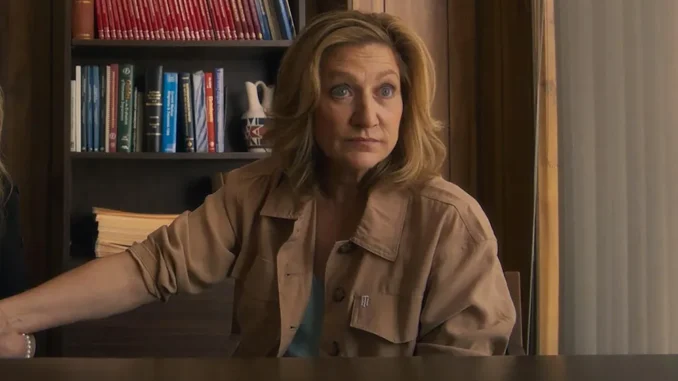
In the ever-evolving landscape of television and film, few series have left as indelible a mark as The Sopranos. The groundbreaking HBO drama not only transformed storytelling on screen but also ignited discussions that continue to resonate today. Recently, in the docuseries Wise Guy: David Chase and The Sopranos, Edie Falco—who played the unforgettable Carmela Soprano—voiced her thoughts on the current trend of trigger warnings, arguing that they threaten the very essence of creative expression.
The Impact of The Sopranos
When The Sopranos first aired in 1999, it shattered preconceived notions of what television could achieve. With its deep dive into the psyche of mobsters and their families, it forced audiences to confront uncomfortable truths about morality, loyalty, and human nature. Falco emphasizes that the series didn’t shy away from depicting the seedy underbelly of crime. Instead, it embraced the complexity of its characters, showcasing their charm alongside their brutality.
Art Should Challenge Us
Falco’s perspective is straightforward: art should be provocative. “You can push the envelope and let people be uncomfortable,” she stated, expressing her belief that audiences need to engage with complex, often unsettling themes without preemptive warnings. Her comments shine a light on a significant dilemma faced by creators today: how to balance artistic integrity with a growing sensitivity towards potentially harmful content.
The actress specifically referenced a shocking scene from The Sopranos involving a woman’s murder, which she argues would likely face scrutiny today. This moment, like many others in the series, was crafted to elicit genuine reactions from viewers—something Falco believes is crucial to understanding life in all its messy, unpredictable glory.
The Woke Debate: Trigger Warnings vs. Artistic Expression
As society leans more toward a “woke” narrative, the conversation around trigger warnings has intensified. These warnings aim to prepare viewers for potentially distressing content, but Falco and other creatives argue that they might dilute the emotional impact of a story.
The Dangers of Sugar-Coating Reality
According to Falco, sugar-coating immoral behavior—whether in a drama about mobsters or any narrative—would diminish its authenticity. “The whole point is you want to surprise people and give them feelings that may be uncomfortable and have them learn to deal with them,” she argues. By shielding viewers from the harsh realities portrayed in art, we risk losing the opportunity for growth and understanding.
Veteran Sopranos writer Robin Green echoed these sentiments, emphasizing that the show’s creators had the freedom to depict mobsters as they truly are—mean, vicious, and sometimes inhuman. “We said things that nowadays would be frowned upon,” Green remarked, highlighting the fine line between artistic expression and societal expectation.
The Cultural Shift in Creative Expression
While Falco and Green defend their artistic choices, not everyone in Hollywood has been so vocal. The rising tide of cultural sensitivity has led many creators to tread carefully around contentious subjects. This has resulted in a significant shift in how stories are told.
Is Art Becoming Too Policed?
Many in the industry worry that the call for trigger warnings and sensitive storytelling could lead to self-censorship among writers and filmmakers. This concern isn’t unfounded, as seen in the backlash against Goodfellas, Martin Scorsese’s iconic mob film, which was subjected to a trigger warning by AMC. Scorsese, known for his impactful storytelling, remained silent on the matter, leaving some to wonder if such warnings stifle creativity.
Prominent British actors like Dame Judi Dench have also criticized the trend, arguing that trigger warnings undermine the integrity of art. Dench, among others, believes that viewers should engage with content as it was intended, rather than being shielded from its potential impact.
Balancing Sensitivity with Honesty
The conversation surrounding trigger warnings raises important questions about how we navigate the intersection of art and society. On one hand, we have a responsibility to be mindful of mental health and the experiences of others. On the other, there’s an undeniable need for art to reflect the complexities of human experience—often involving uncomfortable truths.
The Role of the Viewer
As Falco points out, life doesn’t come with trigger warnings. It’s a messy affair filled with unexpected challenges and harsh realities. Viewers have a role to play in this dialogue. Engaging with difficult material can foster understanding, empathy, and personal growth. In many ways, the discomfort that arises from challenging content can be a catalyst for meaningful conversations.
Conclusion: The Artistic Path Forward
Edie Falco’s remarks in Wise Guy: David Chase and The Sopranos highlight a crucial discussion about the nature of artistic expression in today’s world. While sensitivity and awareness are important, they should not come at the expense of creative freedom. The ability to explore uncomfortable themes is what allows art to resonate on a deeper level, pushing us to confront the complexities of life.
As we continue to navigate these discussions, it’s essential to strike a balance between compassion and authenticity. After all, the power of storytelling lies in its ability to challenge us, evoke emotions, and prompt us to reflect on our own lives.
